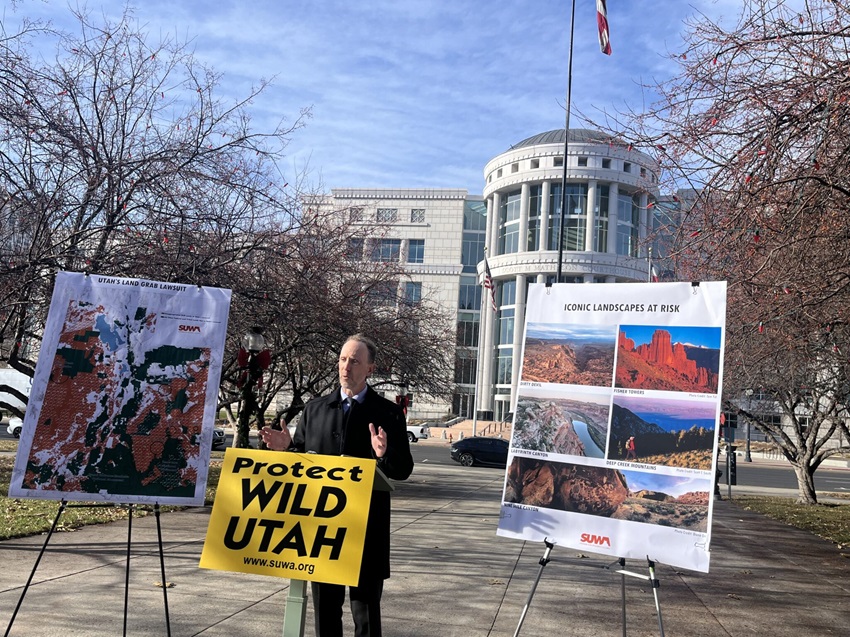Ogden, UT – Environmental advocates have filed a lawsuit against Utah Governor Spencer Cox and outgoing Attorney General Sean Reyes, accusing them of engaging in “unlawful land grab litigation.” The lawsuit, which centers on Utah’s efforts to claim control over 18.5 million acres of federal land, is now set to be reviewed by the U.S. Supreme Court, as the state seeks to bypass the usual legal processes in a direct appeal.
The state’s legal challenge, which has garnered widespread attention, is framed as an attempt to resolve long-standing questions about land ownership and jurisdiction. Utah leaders argue that the federal government has failed to adequately manage the land, much of it controlled by the Bureau of Land Management (BLM), and that the state should be able to exercise control over it. Governor Cox has advocated for this move as a solution to what he sees as an imbalance in land management. The case has been widely publicized through a multimillion-dollar campaign, with billboards, TV ads, and newspaper spots across the state, all urging residents to “Stand for Our Land.”
In the lawsuit, Utah claims the land in question—currently classified as “unappropriated”—should be transferred to the state. The legal action also addresses broader issues related to the land, which makes up 34% of the state’s total area. Utah officials believe this legal challenge will provide clarity on the ownership and management of these lands, which are crucial to both the state’s economy and its identity.
However, environmental groups are sounding the alarm over the potential consequences of the lawsuit. The Southern Utah Wilderness Alliance (SUWA), one of the primary organizations opposing the suit, argues that the state is violating the Utah Constitution, which explicitly disclaims any right to federal lands. The provision, which dates back to Utah’s statehood agreement, states that the state of Utah “forever disclaims all right and title to the unappropriated public lands” within its boundaries. This was a key condition for Utah’s admission to the Union, and SUWA contends that the state’s current legal challenge contradicts this original commitment.
Steve Bloch, the legal director for SUWA, expressed deep concerns about the implications of the lawsuit. “We filed this lawsuit, alleging that they have violated the state’s compact that we would forever disclaim our interest in these federal public lands,” Bloch said in a statement. “The federal public lands in Utah have never been ‘state lands,’ and they were never owned by the State of Utah. The state is attempting to reclaim lands that it long ago disclaimed.”
The lawsuit has sparked intense debate over the future of public lands in the American West. While the state’s legal team argues that it is simply asserting its rights to manage the land, SUWA and other environmental groups fear that a successful ruling for Utah could lead to the privatization or sale of these lands. This could open the door to development, mining, or other commercial activities that could irreversibly alter the region’s iconic landscapes.
“If Utah is successful, the Supreme Court could order the federal government to start disposing of or selling off these lands to the highest bidder,” Bloch warned. “And that could set a dangerous precedent for public lands across the West.”
The lawsuit has attracted national attention, drawing in environmental advocates, local communities, and recreational users, such as hunters and anglers, who rely on public lands for outdoor activities. These groups are united in their concern that a ruling in favor of the state could drastically change the way public lands are managed, particularly in areas known for their scenic beauty and ecological value, including the Dirty Devil, Fisher Towers, and Nine Mile Canyon.
Despite significant opposition from environmental groups, the state’s lawsuit has gained the support of 12 other Western states, which argue that Utah’s lack of control over such lands is problematic for regional governance. However, the U.S. Department of Justice has weighed in against the state’s motion, calling the lawsuit “without merit” and urging the Supreme Court to deny Utah’s request for review.
As the legal battle moves forward, all eyes are now on the U.S. Supreme Court, where a decision on whether to take up the case could have far-reaching implications for the future of public lands in the United States. Advocates on both sides of the issue are bracing for a fight that could reshape the management and fate of millions of acres of land in the American West.

